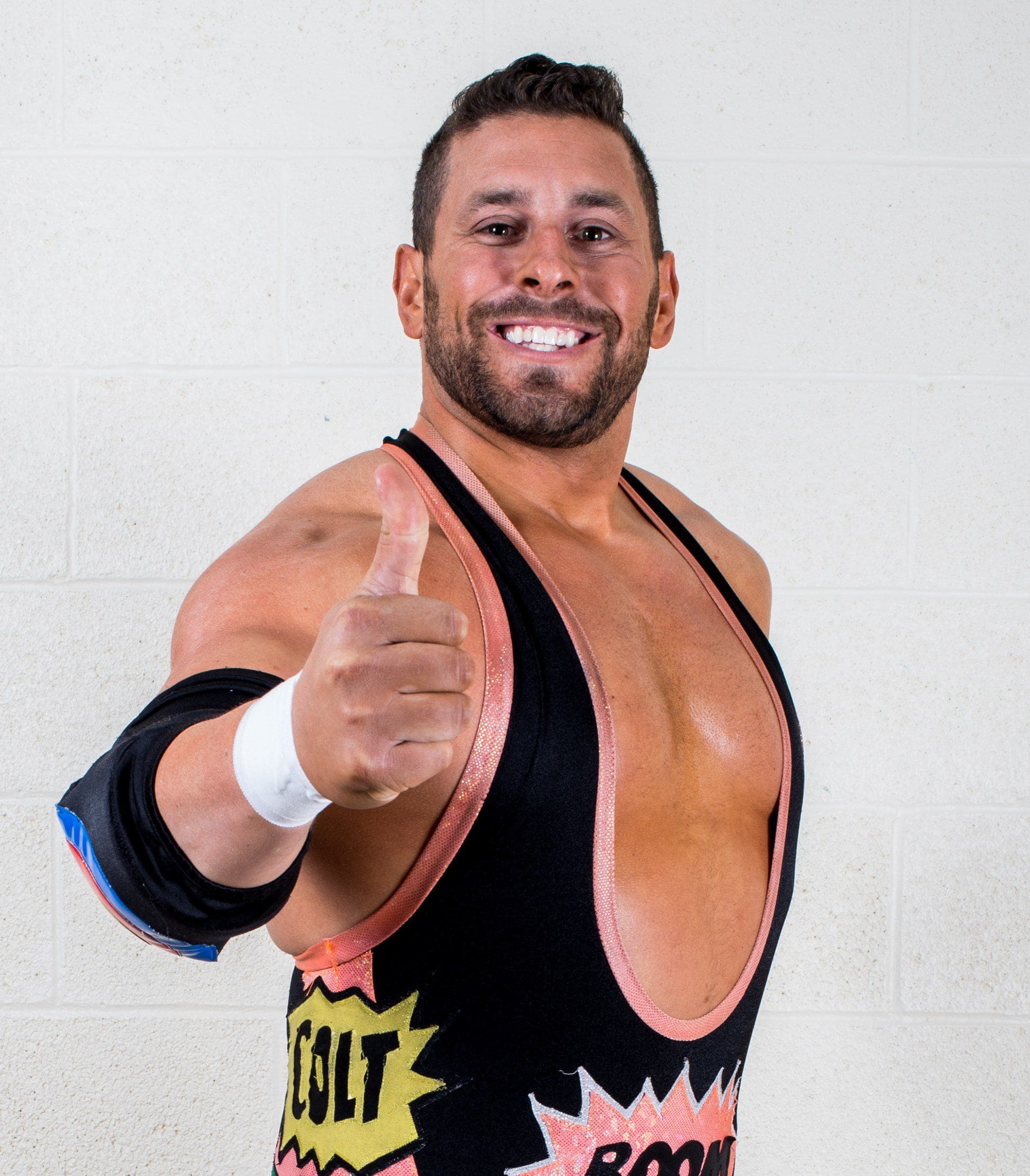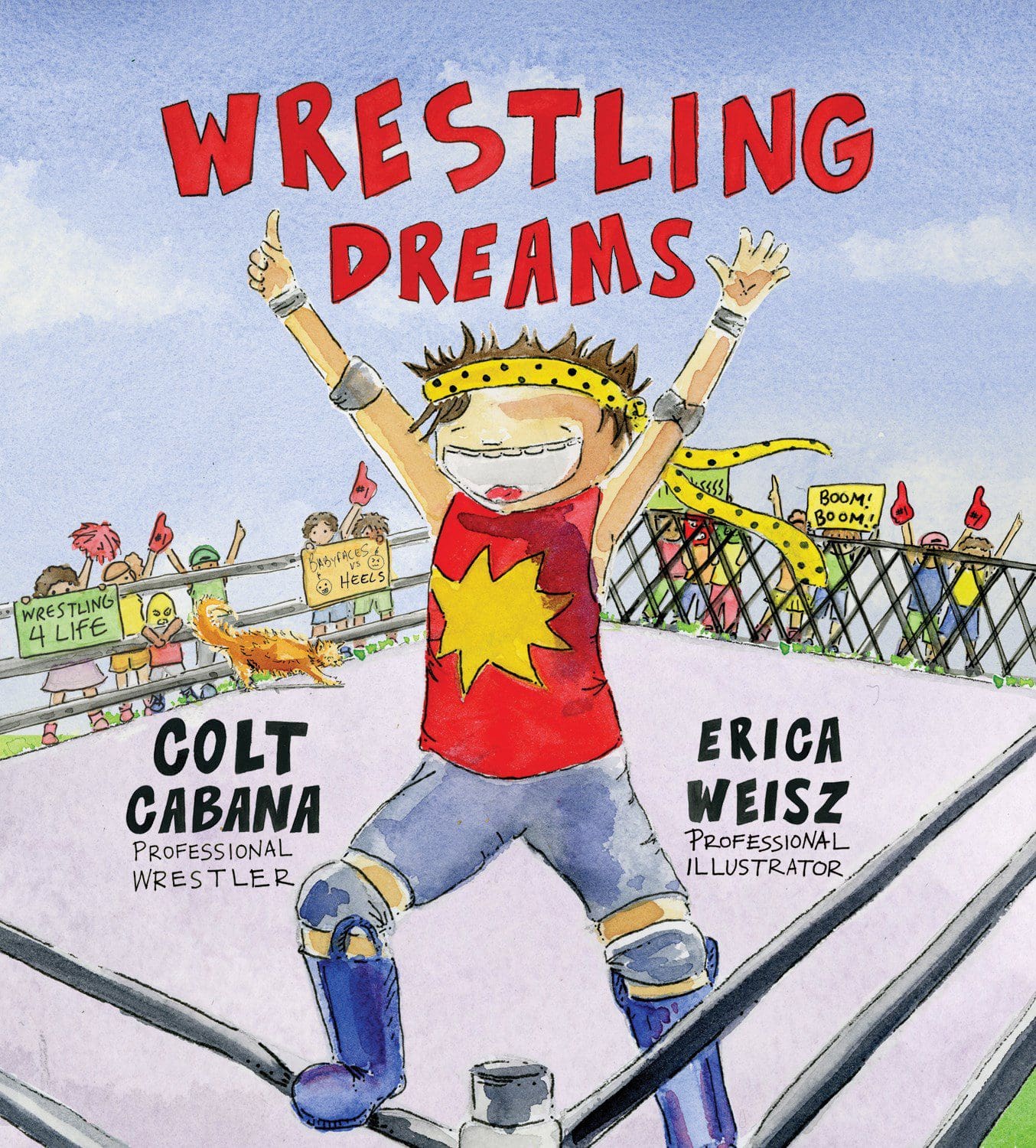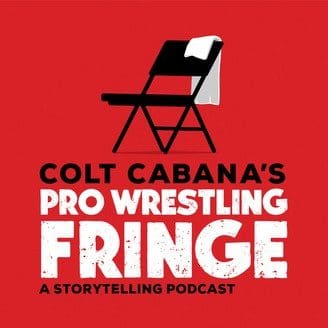
Colt Cabana is an inspirational figure.
If you’re reading this you already know Colt’s story. An undeniably talented professional wrestler who was one of the forefathers of Ring of Honor. He was signed to WWE’s developmental system, then brought up to Smackdown! as Scotty Goldman where he was squashed a handful of times, and then released in 2009.
And this where the inspiration part comes in to play.
Instead of calling it a career, Colt went all in. Not just on wrestling, but on himself. The 37 year old Chicago native has spent the last eight or so years reinventing himself as not only a dynamic wrestling who specializes in comedy, but also as a revolutionary podcaster, filmmaker, comedian, announcer, actor, and a game changer in the world of wrestling merchandising.
Colt not only became the blueprint for how independent wrestlers should conduct their business successfully. He became an inspirational figure to just about anyone.
He’s someone who could’ve (and justifiably) called it a day on his dreams. However, he preserved, he worked hard, owned his frustrations and he never gave up on himself and he’s doing what he loves full-time.
Recently, we caught up with Colt to talk about his latest project, the children’s book Wrestling Dreams, his move to commentary with Ring of Honor, and the future of his podcast.
Let’s talk about the book, Wrestling Dreams. As a dad of a three-year-old, I look forward to ordering this and reading it to my kid. So what was the inspiration to do a kid’s book? I know you’ve said on your podcast you’re not a reader yourself and you’re not a parent, so why go for a kid’s book?
I’m not a reader, it’s true. I had no visions of doing some giant autobiography, but I think this is such a fun way to put out a book. I do love children, and I love working with children. It’s one of the reasons I love being a wrestler — those interactions with the little kids.
Nowadays in the age of the smart wrestling fan, to see the innocence of a child, to wrestle in front of them, is one of my favorite things. You can just to get away from all of the judgement or whatever it might be. Just performing for fresh eyes who don’t really care, they just want to see something fun.
And so to have something for that kid that comes to the wrestling show, to be able to buy a book, or parents buy the book for their child. Also the idea of all these parents that come to these shows, you know, to introduce them to wrestling. I think it’s such a wonderful thing. And I know as a kid, when I went to the library as an obsessed child about wrestling, all I would look for is wrestling books.
Same here.
You know there was this one that was a tribute book and it had The Missing Link on it and it was the only book and I’d check it out like a million times. [laughs] So you know, to give another option is my privilege.
You said you didn’t want to put an autobiography out, but yet this is – obviously, it’s a fictionalized version of you as a kid – but how much of that book was true to life?
It’s a lot based on me and wrestling around as a kid — jumping on my mattress and using my mattress as a wrestling ring. My mom was always around and watching and also kind of shaking her head at me. But she always being behind me and being happy about what I was doing. So a lot of it is true to life.
And there’s a lot of wrestling references – maybe I was reading into it too much – like small wrestling references where your best friend, Marty. I was wondering if that was a reference to [comedian] Marty DeRosa? Also, what was your favorite little detail that maybe someone might miss but something that you were really happy you got that in there.
Well, Marty, yes Marty DeRosa, but actually Shawn and Marty are references to Shawn Michaels and Marty Janetty. So it’s kind of a callout to the rockers. And then my cat was Dusty, obviously.
One thing I really loved, actually my favorite part of the book, was that last page about having someone in your corner. I thought that was just a great message to kids, and actually everyone. How important was it for you to have, as a wrestler and an independent businessman, to have someone in your corner believing in you the whole time?
My friends and family have always been supportive but I guess the other side of it was a lot of fans were super supportive and the only reason I continued after being fired by the WWE was I knew that I had so many fans.
If I was a wrestler in the WWE who had just gone up through the system and been fired, I guess I would have just stopped wrestling because I wouldn’t have had any fans. I’ve been wrestling for so long that I have so many supportive fans that were reaching out on the internet, email, and were so looking forward to the next step in my career that it really kept me going as a wrestler. If not for them I’d probably be working in an office right now.
One of the things post-WWE you did was your podcast which broke a lot of ground. Now you’re pivoting to a new format. Can you give us a breakdown of how it’s going to work? What I took away from your original announcement was that it would be a lot like the old Weekend Escapades show that Kevin Owens (then Kevin Steen) did on YouTube.
I have a vision in my head and we’ll see if it gets there, but it’s kind of like The Road Diaries. That’s a good way to look at it, that’s how I looked at it, as Weekend Escapades and then also what The Young Bucks were doing before they turned it into a sketch show.
As I travel around and stuff happens, I just want to gather it audio-wise and then I can edit it up and chop it up. The first part of my podcast I do those monologues. I envision having the first part of the monologue talking about my weekend and then as I’m doing that I’m inter-splicing these clips of stuff that has happened over the weekend.
But also, still talking to wrestlers and different people. I really wanted to relieve the pressure and that’s what was getting at me, all the pressure to have guests on and have a different chat every week. So as long as in my head I can keep it low stakes and low pressure I can still produce something for somebody every week and enjoy what I’m doing.
Were you nervous making that announcement that you were going to stop doing the interview part of it?
No. I knew it was time. It ran its course, at least in my head. Everyone else was coming out with shows and it wasn’t as fresh as it was, the idea of it. I do know there are people who have been listening forever and would be sad if I stopped so that’s why I didn’t want to. I think it would be a little sad if I just stopped doing it altogether, but I knew I wanted to go forward and continue doing something. So I wasn’t nervous. I was ready. And I am ready. I knew that was the right point in my heart. I am a big believer in gut feeling, going with your gut, I was ready, it seemed ready, the time was ready. I’m more excited and less nervous about it.
You seem in many respects ahead of the curve. You were doing the podcast before a lot of people. Do have you the type of mentality that you’d rather stop something a year early than two years too late?
Yeah, probably. I mean, in saying that, I probably should have stopped this a year ago but I didn’t. [laughs] I knew that I didn’t want to start having rookies on my show that nobody knew. And if I did, I think with this new format, I could have a rookie on for five minutes or whatever in the sense of, hey this is about our travels, as opposed to breaking down their career and going down their career, as there would be no career, no story. This new show is more about the present as opposed to the past.
So this is all, like you said, an audio road diary. Would this ever impede a fourth chapter of the Road Diaries documentary series?
I’d like to make some, but it’s about the right timing and the right people and the right place. I’ve had ideas of doing them overseasbut they are expensive to make and very time consuming. In a perfect world I’d make another one but I don’t know, it’s all about circumstances.
Has anyone ever come back to you from the podcast and say how being on that podcast has impacted their careers? I know the podcast has changed my thoughts and made me a fan of a number of different wrestlers.
A lot of people have. I think Domino [Cliff Compton] told me it gave him a second career, it didn’t just impact him. He was going to be done and then he literally had a second wind just off of the show itself.
Let’s transition to Ring of Honor. You’re announcing at the moment. How did you feel when they first approached you?
Well they didn’t really tell me, it just kind of happened. I didn’t really have time to react to it. I did the 15th Anniversary Show and they asked me commentate and I said sure. Then I showed up the next week for television with my gear and I was like “What am I doing?” and they were like “Oh you’re announcing.” I was like “Oh, ok.” I showed up the next week and had my gear and said “What am I doing?” and they said “You’re commentating.”
I kind of figured out what was happening. That’s kind of how the story of me becoming a commentator for Ring of Honor happened. I mean, I don’t hate it, and I’m wrestling all over the place, I still have a full-time wrestling schedule. If I wasn’t able to wrestle anywhere, it might do my head in a little bit. But the idea, just two weekends ago I was in Winnipeg and Thunder Bay [Canada] and I was touring; I was in Texas last week. I’m still such a full-time wrestler that going to these shows is kind of a nice little break I guess, a little bit.
Yeah I was going to say, it’s got to help with your longevity a little bit because you are getting paid and you’re getting a break from being in the ring, so maybe it’ll be good for your career in a weird way?
Yeah, it’s a nice little transition. I’m thirty-seven now so it’s a nice slow transition that I’m working a full-time schedule. I’m also doing a full-time commentating schedule and it’ll probably gradually – who knows. It’s weird to think about but the Ring of Honor commentating gig could be a 10 year gig, you know, into my forties. So I think it’s nice to think about that it could be a thing.
Do you find it a new creative challenge to commentate?
I enjoy wanting to get really good at it. I know it’s not my first gig, but it’s been almost a year so I enjoy seeing me get better within time. Also as a wrestler there’s so much stuff that I can see that I know [other commentators] don’t see coming. And even the ring truck and the directors don’t see coming, just because of the years of wrestling experience. I like the idea that I can add that layer to the commentating team that isn’t there unless I’m there. That makes me feel like a bit of an expert in a way, so it’s nice not only for my ego but creatively, I know that I’m helping out in such a great way.
Speaking of creative, you do the Edinburgh Fringe every year, you do live shows with Marty DeRosa, doing the comedy but do you feel like any of that has directly impacted what you do in the ring and/or has wrestling impacted your onstage performances?
I think the years of wrestling has helped me on stage, and also I think the last six years of doing the fringe has also helped me as a performer, as a wrestler. I think they both really help each other but I think it’s not one in the same since they both really help each other. I think becoming a better performer on the regular stage, and being a stage performer, I think has drastically helped me as a wrestler.
I do a little standup, but the main thing is improv and wrestling improv. So it’s a lot of stage performance and reading a room and letting reactions kind of get reactions and not stepping on reactions and letting reactions die down before you move to something else. And then in terms of jokes too, building jokes is the same as building a wrestling match and that kind of psychology. And in terms of that kind of live performance, it’s crowd manipulation in a way. I think they both help each other in that way.
I have a theory that right now as a wrestling fan, it’s one of the greatest times to be a wrestling fan because you can watch wrestling from all over the world at the snap of your fingers. Right now as a wrestler, do you think this is one of the great times for wrestling because of the proliferation of it through streaming services and the internet, or am I just overhyping it as a fan?
I can look at every side of every story and I can try to look at every situation, so one thing is you can say “Hey I can watch wrestling all over the world.” Another thing is – not that the territories are gone – but there’s no different styles of wrestling now. All the wrestling styles are sort of merging into one. There was a time where in the UK they were wrestling in different styles than they were in Germany and their wrestling style was different in Japan and Mexico. And I’d say Mexico is the only one that’s keeping to itself.
But you know, as you see in Japan, the Japanese and the American style are kind of meshing into one whereas that wasn’t a thing. As a performer, we don’t have the ability to go different places and see what works and learn different styles of wrestling really anymore, and so that’s a way to look at it as a negative.
But it terms of a wrestling fan, yeah, I think it would be… All we could do as teenagers is look at a magazine, look at the pictures and just assume what they were doing.



